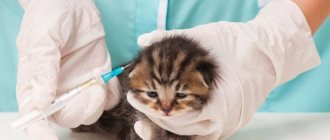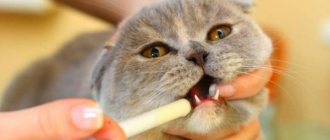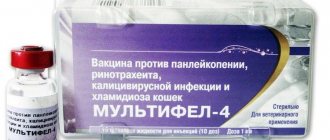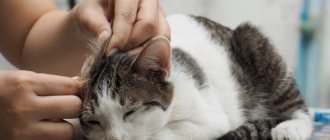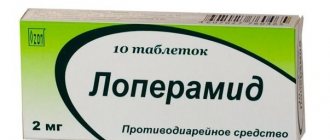Vaccination of kittens is a subject of debate for many breeders and lovers of these amazing animals. Some people are concerned about the consequences of vaccination, while others are afraid that their pet will feel unwell after the injection. Such fears are unfounded. Despite the fact that vaccinations can cause the development of temporary illness in kittens, the benefits from them will be several times greater. Experts insist on the need to introduce vaccines into the body of kittens and adult cats, since this is what will prevent complex infections in them and even save lives.
List of standard vaccinations and schedule
Every pet must be vaccinated against the following diseases:
- Panleukopenia (in common parlance – plague). This is the most dangerous disease, often leading to death. It affects cardiac and respiratory functions.
- Viral tracheitis. This disease affects the respiratory system. It is accompanied by rhinitis, conjunctivitis and discharge from the sinuses. This disease is fatal.
- Chlamydia. With the disease, respiratory and visual function are impaired. Sometimes there is a disorder of the digestive system. As a result, the pet becomes infertile or dies.
- Calicivirus infection. It is difficult to treat, since the pathogen can mutate. Signs of the disease are cramps and lameness, accompanied by a cold.
- Rabies. The disease is dangerous both for the animal itself and for its owner. Such infectious diseases are the most dangerous for a kitten, for this reason vaccinations should be done first.
Currently, there are two types of animal immunization:
- a set of vaccinations against 4 major ailments;
- separate injection for rabies.
Vaccination is carried out only if the cat is completely healthy; for this reason, it needs to be examined by a veterinarian. It is possible that the animal may have a personal intolerance to the injected drug, but the injection will still have to be given. This will help your pet suffer from the disease in a less tragic way.
Also read the article about vaccination of adult cats.
What are kittens vaccinated against?
The immunization schedule is as follows:
- The first vaccination is given to a kitten at 2 months;
- the second – at 3 months of age;
- the third – at the age of 1 year.
In the future, vaccination is carried out annually, and the injections must be renewed each time.
This scheme should be followed from birth until the moment the animal dies. This way the pet can live for a very long time. To easily track the time of vaccine administration, you can purchase a special diary at the veterinary hospital.
What are the best vaccines for cats?
For healthy kittens, it is more convenient to administer complex medications for many diseases at once. The best are considered:
- Nobivac (NOBIVAK TRICAT Trio) strengthens the immune system gradually, against three dangerous cat diseases at once (see list above). To prepare the solution for kittens up to 3 months old, use “Diluent”; the rest are diluted with a dry culture of pathogens with “Rabizin”;
- Purevax RCPCh is an analogue of Nobivak, contains dead cultures, a gentle drug.
- Leukorifelin is a vaccine of the same group as the two previous drugs.
- Kadrikat is a 4-component vaccine that includes feline diseases and rabies strains. The drug is used for primary immunization and revaccination.
- Multifel - a four-component composition, in addition to protecting against diseases dangerous to cats, develops immunity to chlamydia.
- Vakderm is a comprehensive vaccine for walking pets that protects against many diseases of a viral, infectious and fungal nature.
When purchasing a vaccine yourself, it is important to observe the storage regime for the drug during transportation. The ampoules are placed in a thermal container.
Primary vaccination and its distinctive features
From the age of 2 months, each kitten needs to be vaccinated regularly. At earlier stages, vaccinating an animal is pointless, since the body will not develop the required immunity. Primary immunization is necessary so that the pet’s body learns to resist many pathogens. This will help improve the health of the four-legged animal and also prolong its life.
Immunization is a strong stress for the baby's body. To avoid possible consequences, it is recommended to give the injection at home. In a familiar environment and next to the owner, the cat will tolerate this procedure more easily.
Before vaccinating a kitten for the first time, the possibility of contact with sick relatives should be excluded. If the baby interacts with an infected animal, immunization must be rescheduled.
This requirement also applies to pets who have undergone surgery. Primary vaccination for a four-legged friend is allowed only 25 days after surgery.
If a cat's baby teeth are replaced by permanent ones, the injection should be carried out after they are completely replaced.
Primary vaccination can provoke the development of adverse reactions in the form of lethargy, drowsiness, loss of appetite, loss of interest in games. This phenomenon is a normal reaction of the body to the administered drug.
If the baby refuses food for more than 24 hours, there is an increase in temperature and indifference, you urgently need to seek help from a veterinarian.
Should a domestic cat be vaccinated?
All pets need to be vaccinated, even if they do not leave the perimeter of the apartment or the area near a private house. It is impossible to create ideal sterile conditions, so it is necessary to vaccinate cats from an early age to old age. But hold on to your wallets more tightly - injections are carried out at large intervals.
Even a lazy domestic cat that has not attempted to escape can become infected with a bunch of diseases. Panleukopenia, herpesvirus, calcivirosis, and other diseases are often diagnosed in unvaccinated recluses who lead a home lifestyle.
There are plenty of possible ways of infection:
- Pathogenic flora, parasites enter the house with particles of dust and dirt on shoes, bags, and other objects. Many viruses remain viable for a long time on dry surfaces at sub-zero temperatures. A small population of microorganisms is enough to cause a disease.
- Pets do not develop immunity on their own. Those immunoglobulins that are transferred to the kitten from the mother cat are destroyed within a few months. New protective proteins are not synthesized, and the brain does not send signals for their production. Animals living at home can die from diseases that the street cat’s immune system can cope with on its own.
- Active carriers of infection are children living in the home. Often, homes with domestic cats also have dogs. And in the most comfortable apartments there are mice, rats, and insects. They penetrate through ventilation and cable shafts, pipes, gnaw holes under the floor, live in garbage chutes, basements, and utility rooms.
- A special risk zone is houses located next to shops, catering establishments, and technical wells on heating mains. Urban environmental conditions contribute to the development of infectious diseases and viruses.
- Traveling in a carrier bag is also unsafe for a couch potato. Visiting someone else's apartment or dacha is stressful for an animal. Against this background, the immune system weakens, microbes penetrate the cat’s body unhindered. If a meowing creature lives in a private house and rarely goes for walks, vaccinations against rabies and other diseases are required. At night, “uninvited guests” walk on the lawn.
Of course, each pet owner independently decides whether to vaccinate domestic cats. But by protecting their pet from a harmless injection, they expose it to mortal risk, and increase their chances of contracting zoonotic diseases.
Age for rabies vaccination
Immunization against rabies is carried out for the baby at the age when communication with other animals begins (at about 3 months).
In cases where the cat practically does not communicate with its relatives, the vaccine is administered at 6-8 months of age.
Re-vaccination is carried out annually at approximately the same period.
Usually, an anti-rabies injection has a strong effect; as a result, after vaccination, the baby becomes lethargic and weak, in addition, the temperature rises for a couple of hours.
Rabies vaccination: when to do?
Rabies is one of the most dangerous diseases, the pathogens of which can affect the body of most animals, as well as humans. This is a deadly infection that does not give living creatures a chance to survive. The only protection against a fatal outcome is timely prevention of pathology, that is, vaccination against rabies.
The rabies vaccine is one of the rather aggressive immune preparations. In the first days after the injection, vaccinated animals may feel general discomfort, their appetite worsens, and malaise appears. If your pet has such symptoms, then this is not a reason for concern, since after a couple of days they disappear without a trace, leaving no consequences. If you see that your pet continues to be lethargic, you need to consult a doctor.
Vaccination to prevent the disease is carried out for growing kittens who have reached 3 months of age, as well as for adult cats. It is recommended to administer the vaccine annually (some rabies vaccinations allow you to develop immunity for three years).
Key requirements for immunization
When immunizing a kitten, you should follow some rules:
- the drug can only be administered to a completely healthy pet;
- Injections are prohibited for a kitten after communicating with infected relatives;
- after immunization, surgical intervention is contraindicated for 21-25 days;
- after surgery, vaccination is not carried out for at least 21 days;
- if antibiotics are used for therapy, administration of the medication is allowed after 2 weeks;
- It is forbidden to vaccinate your pet when changing teeth;
- the vaccine should not be expired;
- It is contraindicated to vaccinate pets under 2 months of age;
- During the procedure, the baby must be calm.
How do vaccines work in kittens?
Kitten vaccines are usually first given at six to eight weeks of age and repeated approximately every three weeks until 16 to 18 weeks of age.
Some vaccines may be given together in one injection, called a combination vaccine (association vaccination). At your kitten's first veterinary exam, your veterinarian will discuss a vaccination schedule, as well as other treatments such as therapeutic deworming and a further parasite prevention regimen.
The vaccine injection itself is usually not painful. Your kitten may feel a little offended and depressed, but many pets do not react at all to the injection.
At your first visit, your veterinarian will examine your kitten before vaccination. Vaccines should never be given to a kitten with a fever or signs of overt illness, as the vaccine will not be effective. Giving a vaccine to a sick kitten may actually make the underlying disease worse.
Immunity does not develop immediately after the vaccine is administered. It takes five to 10 days for the immune system to take effect. However, kittens with remaining maternal antibodies will also be protected during this period. That is why you should not delay the first vaccination, but do it as early as possible from 2 months. It is impossible to be sure that the kitten still has maternal antibodies, so prophylactic exposures after injections are necessary. True immunity remains uncertain until the kitten is 16 to 18 weeks of age or has completed all preventive periods. Avoid exposing your kitten to unknown animals until all vaccinations are completed.
Possible consequences after vaccination
After immunization, some unpleasant consequences are possible:
- lethargy;
- lack of appetite;
- elevated temperature;
- pain at the injection site;
- encephalitis;
- polyneuritis;
- arthritis;
- convulsive conditions;
- changes in behavior;
- loss or change in hair color in the area where the medication was administered.
Increased sensitivity to the vaccine and immune reaction may manifest itself as:
- inability to develop immunity after injection;
- tumors at the injection site;
- reactions caused by incorrect or untimely vaccination.
Possible complications after vaccination
A decrease in cat activity on the first day after the procedure is considered normal. Pet owners often note increased sleepiness in their kittens.
Complications after vaccinations are rare and occur only in a tiny percentage of cats. Among the main problems are the following:
- an allergic reaction to any substance in the drug (salivation, difficulty breathing) - manifests itself quite quickly after the injection, the veterinarian will prescribe an antihistamine;
- Vaccination of an already infected cat without severe symptoms - the vaccine will cause complications or even the death of the pet.
If after vaccination the kitten's apathy lasts for several days or he refuses to drink, you should immediately contact a veterinarian.
How does the pet behave after manipulation?
Traveling to a veterinary hospital, unfamiliar aromas and people, and, in addition, unpleasant manipulation, are stressful for the animal, especially when it has not been taken out of its home before.
After returning from the hospital, the kitten may refuse food and play, hide in a secluded place and sleep for some time. After getting up, you need to offer your pet a small amount of his favorite treat.
The next time he refuses, you shouldn’t force him. Probably, the first day after vaccination the baby will only drink. You need to make sure that there is enough fresh water in the bowl.
During the first two days, you should not ventilate the room where the kitten is - due to a weakened immune system, it can easily catch a cold.
How to prepare for vaccination
Absolutely any kittens need preventive vaccinations - both domestic ones and those who go for walks outside. It would seem that pets who are constantly at home do not risk contracting a dangerous disease, because they do not directly come into contact with stray cats of various health conditions. But this is a big mistake: along with outdoor shoes, the owner himself can bring any infection into the house, which the domestic cat will “pick up.” Therefore, it is necessary to vaccinate your kitten.
© shutterstock
Before going to the veterinary clinic, your baby needs to be well prepared for the upcoming procedure.:
- carry out deworming in 2 doses at least a week before the first vaccination (one tablet is given, and after 10 days, when a new generation hatches from the eggs of worms, a second one);
- a week before vaccination, treat the kitten against fleas, ticks and similar parasites;
- Bring your pet to an appointment to be examined by a veterinarian.
During the examination, the doctor draws up an individual vaccination schedule based on the animal’s health condition.
Mr. Cat advises: the most famous drugs for vaccination
The following products are used to immunize kittens:
| Name of the drug and for what ailments | At what age is it introduced, in weeks? | Re-introduction |
| Nobivac Tricat. Complex barrier against rhinotracheitis, calicivirus infection, plague. | 9-12 | After 21 days |
| Nobivac Rabies. Against rabies. | 12 | Not required |
| Quadricat. A comprehensive barrier against disease and rabies. | 12 | After 12 months, however, the rabies component is excluded |
| Eurifel RCPFeL.V. Cumulative protection and feline viral leukemia. | 7 | In 5 weeks |
A comprehensive barrier against three diseases and chlamydia:
| 7-8 | After 28 days |
| 8 | ||
| 8-12 | ||
| 10 |
| |
| Primucell FTP. A drug against infectious peritonitis. | 16 | After 28 days |
| Vakderm F. Protection against microsporia trichophytosis. | 6 | After 14 days |
| Microderm. A drug for lichen. | 6-8 | After 21 days |
| Polivak TM (for cats). Protection against dermatoses. | 10-12 | After 5 weeks |
Types of vaccinations
What diseases are kittens vaccinated against?
- Plague;
- Feline leukemia;
- Infectious peritonitis;
- Panleukopenia;
- Viral rhinorrhitis.
Vaccination against the above diseases is given to all kittens, regardless of breed.
Experts recommend giving preference to imported vaccines. They are considered safer and more effective.
In the case of rabies vaccination, both domestic and imported vaccines are considered to be of high quality.
Doctors have different opinions regarding when to give kittens the first vaccinations; it is recommended to carry out the primary vaccination at 2-3 months.
Despite the fact that some advise vaccinating a cat at home to avoid fear and stress on the part of the baby, you should choose a baby together with a veterinarian
In the first months of life, kittens are given so-called polyvalent vaccines that protect against several diseases.
Despite the fact that some advise vaccinating a cat at home to avoid fear and stress on the part of the pet, you should choose a vaccine together with a veterinarian.
You will be offered options depending on the characteristics of the animal, the region and the conditions in which it lives.
Separately from the first vaccination, an injection is given against rabies and against ringworm (as in dogs - against ringworm ).
Immunizing your pet before traveling
When planning a trip with your pet, you need to get a certificate from the veterinarian with information about the vaccination performed. Such documentation will be needed to purchase a ticket for any public transport traveling long distances.
The immunization document must be issued in accordance with the law and include information about the vaccinations given to the cat. If the trip is made to another region of the state, obtaining a certificate from a veterinarian is an indispensable condition.
Features of vaccination of young animals
We have already discussed when to vaccinate kittens. In this case, the doctor must make sure that the animals are absolutely healthy. Pet owners should also keep an eye on their pet. A healthy kitten is characterized by a good appetite, normal body temperature, and an active lifestyle.
The animal should not sneeze or cough, and you should also pay attention to the presence of discharge from the nose or eyes
If there is any suspicion that the kitten is sick, then under no circumstances should you give it injections.
You should also refuse vaccination if the day before your pet had contact with any sick animal. If your little pet has undergone surgery, the date of the first vaccination for the kitten is determined by the doctor. As a rule, injections are not given for 3 weeks after surgery.
Also, experts do not recommend vaccinating kittens whose teeth are changing.
Owners of furballs should know not only when their kittens get their first vaccination, but also what medications are used.
Vaccination of Scottish and British kittens
The Scots and the British are artificially bred breeds of cats, as a result of which they have almost no immunity of their own. Therefore, it is necessary to introduce all the required vaccines in childhood, since the possibility of infection is very high.
Although pets of such breeds are ornamental animals that rarely leave their homes, immunization must be taken seriously. These kittens do not need any special vaccinations. The drugs are suitable for any four-legged friend.
How much does vaccination cost - approximate prices at veterinarians
The cost of vaccination for a kitten includes payment for veterinary services, maintenance costs (general expenses), plus the drug. The cost consists of:
- Prices for the vaccine range from 1.5 dollars to 12.
- Registration of a vaccination veterinary passport will cost from 50 to 100 rubles.
- Examination of the animal is still the same.
- Prices for one injection start from 300 rubles.
- A doctor's visit to your home is paid additionally.
Prices depend on the region, the status of the clinic, and the education of the staff.
Fluffy meowing pets, when they appear in the house, become full-fledged members of the family. Their health is as important as that of the rest of the household. It is important to remember that cats can infect people. Keeping a home will not protect you from disease.
Schedule details:
- The first time the vaccination is given to kittens (from eight weeks of age or more).
- The next one takes place three weeks later, and another one a month later.
- After one month, an anti-rabies drug is injected.
- A year later, a comprehensive vaccination is carried out.
- A month from this date, the rabies injection will be repeated.
- After this, the procedure is repeated every year.
- Much depends on the mother: if she is vaccinated, the kitten can be injected from the age of twelve months, if not, it is better to play it safe and start at eight months.
- Make sure that there is no change of teeth at this time (this happens at the age of six months).
- A pregnant cat should not undergo the procedure if the medicine has “live cells” to avoid infecting the kittens.
- Always conduct a preliminary inspection of the animal. You may accidentally make the situation worse rather than help your pet.
- Don't forget to clear out the parasites a few weeks in advance. You should ask your veterinarian for more details.
- It is better to leave the animal with the doctor for several hours immediately after the injection. This will help you quickly react to allergies if such a reaction occurs.

